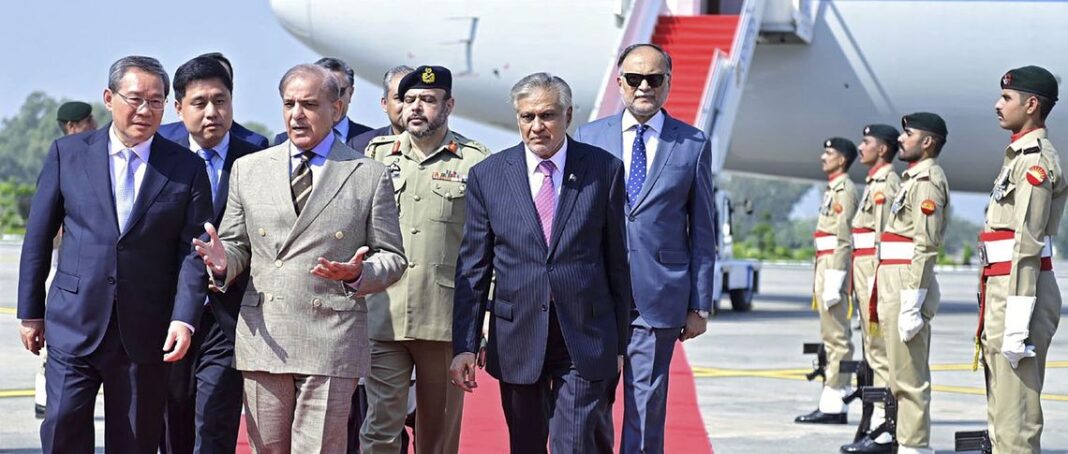The recently concluded Shanghai Cooperation Organization’s Council of Heads of Government (SCO-CHG) meeting in Islamabad was shrouded in controversy, mostly emanating from within Pakistan.
A wave of terror attacks in Balochistan and Khyber Pakhtunkhwa, along with massive protests from the opposition Pakistan Tehreek-i-Insaf (PTI), diverted attention from the summit. Pakistan’s capital, Islamabad, was put under a strict security lockdown for five days as Chinese Premier Li Qiang arrived in the city on a ‘state’ visit ahead of the heads-of-government gathering for the SCO summit. Li’s visit was the first by a Chinese premier to Pakistan in 11 years. Many analysts saw this year’s SCO gathering as a bilateral summit between China and Pakistan rather than a multilateral event.
According to reports, China was worried about the potential failure of the summit due to the unstable political and security situation in Pakistan and had possibly convinced the SCO member states, on Islamabad’s behalf, to participate in the summit.[1] In the official deliberations, Pakistan openly batted for China by promoting the Belt and Road Initiative (BRI), including the China-Pakistan Economic Corridor (CPEC), thereby ignoring the participating countries’ sovereignty and Chinese ‘debt trap’ concerns. As a result, questions were raised regarding the inclusive nature of the summit, which saw a biased endorsement of Chinese economic and regional policy views.
Moreover, Pakistan tried to blame Afghanistan for emerging security challenges in the region to divert attention from its own homegrown terror outfits responsible for creating instability in neighboring countries.[2] While the SCO has a mandate to discuss security, the Islamabad summit focused on trade, humanitarian and cultural issues to avoid embarrassment for Pakistan on the issue of terrorism. All these reasons made the SCO forum look politicized and less serious about tangible outcomes on issues like security and regional connectivity, among others.
In the weeks leading up to the summit, Pakistan’s state authorities cracked down hard on political dissent, banning an ethnic nationalist movement, Pashtun Tahaffuz Movement (PTM), and introducing new laws that restrict protest in Islamabad.[3] Schools and businesses were shut, along with shops for essential items, amidst a large contingent of police and paramilitary forces deployed for the security of foreign delegates. Many people, including members of opposition political parties, complained about the forced curfew in Pakistan’s capital region. Roads were utterly deserted, and Islamabad was entirely cut off from other parts of the country.[4] Even hospitals were off-limits for people, and most medical shops were also closed during the summit days. One Pakistani journalist said on X/Twitter, “Behind Islamabad’s dazzling lights for SCO 2024 lies a darker reality: a city in lockdown, citizens inconvenienced, and movements curtailed. Let’s not be fooled by the facade. What’s the true cost of this ‘charm’?”[5]
Locals compared the situation in Islamabad with the COVID-19 pandemic curfew in 2020. The threat from terrorist outfits was given as a reason for the unprecedented shutdown in Islamabad. However, analysts believed that the government was more worried about protests from Imran Khan’s party, which would have embarrassed Pakistan internationally. As a result, Pakistan deployed over 10,000 police and paramilitary personnel in the capital city.[6] Additionally, reports indicate that 6,643 police officials, 1,000 Frontier Constabulary (FC) troops, 2,000 Punjab Constabulary officers, and 888 Rangers looked after the security situation in Islamabad – with help from the Pakistan military.[7]
Under Article 245 of the Constitution of Pakistan, which empowers the federal government to call army troops to help the civil administration maintain peace, the Interior Ministry authorized “the deployment of requisite strength of the Pakistan Army in aid of civil powers from October 5 to 17” in Islamabad.[8] Consequently, during the SCO summit, Islamabad looked like a garrison town with deserted roads, road closures, security checkposts, barbed wires and military vehicles everywhere, not just in Islamabad’s Red Zone area, the location of the parliament and a diplomatic enclave.
After the recent suicide attack in Karachi on October 6, which claimed the lives of two Chinese engineers and one badly injured, Pakistan did not want to face more embarrassment and be seen as an unsafe country before the SCO meeting.[9] As Prime Minister Shehbaz Sharif and members of his cabinet received Chinese Premier Li Qiang at the Chaklala airbase in Rawalpindi on October 14, a violent attack on the district police headquarters in Khyber Pakhtunkhwa killed at least three Pakistani security personnel and injured several others. A wave of terror incidents and political violence swept Pakistan in the last month, including the state targeting of non-violent protestors in Balochistan and Khyber Pakhtunkhwa. For example, on October 9, three people were killed in the police firing on a human rights group advocating for the Pashtun ethnic minority near Peshawar.[10]
Moreover, a prominent Baloch activist, Dr Mahrang Baloch, was booked under false “terror” charges before the Chinese Premier visited Pakistan.[11] Notably, Mahrang and other Baloch activists have been openly critical of China’s growing “illegal” presence in Balochistan. Therefore, to avoid any security contingency and criticism from rights groups during the SCO meeting, the government in Islamabad curbed all movements of Chinese nationals in Pakistan, citing fears they could be targets for violence from separatist groups.[12] Due to security concerns, Premier Li and PM Sharif were forced to “virtually” inaugurate the much-touted international airport in Balochistan’s Gwadar port city.[13] The physical inauguration would have met with civilian protests and possible violence from local rebel groups in the province.
To impress China, the Pakistani government even named the SCO media center the ‘Pakistan-China Friendship Centre.’ Additionally, Pakistani media primarily focused on the activities of the Chinese delegation at the SCO summit, neglecting to highlight the multilateral nature of the event for the international audience. Finally, Pakistan’s internal political and security challenges significantly diminished the importance of the SCO-CHG meeting, drawing unwanted attention from critics of the regional organization.
khaama.com

